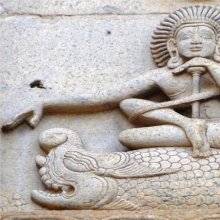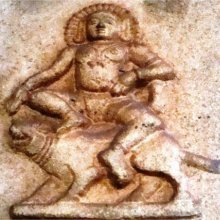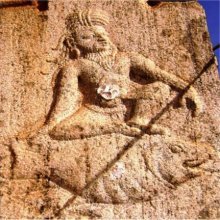Ayoga, Āyoga, Ayas-ga: 18 definitions
Introduction:
Ayoga means something in Hinduism, Sanskrit, Jainism, Prakrit, Buddhism, Pali, Hindi. If you want to know the exact meaning, history, etymology or English translation of this term then check out the descriptions on this page. Add your comment or reference to a book if you want to contribute to this summary article.
Alternative spellings of this word include Ayog.
Images (photo gallery)
(+8 more images available)
In Hinduism
Natyashastra (theatrics and dramaturgy)
Source: Shodhganga: Mankhaka a sanskrit literary genius (natya)Ayoga (अयोग) refers to one of the three types of Śṛṅgāra-rasa (love-sentiment) according to Dhanañjaya (Daśarūpaka IV.50). The ayoga variety of śṛṅgāra, which arises due to the dependent position of one or other of the lovers, though deeply attached to each other, cannot in any way be united, through distance or the intervention of ill-luck, has ten stages of love i.e. daśa-kāmadaśā. This ayoga type of śṛṅgāra may be regarded as a subvariety or the broader class of vipralambha or viprayoga.

Natyashastra (नाट्यशास्त्र, nāṭyaśāstra) refers to both the ancient Indian tradition (shastra) of performing arts, (natya—theatrics, drama, dance, music), as well as the name of a Sanskrit work dealing with these subjects. It also teaches the rules for composing Dramatic plays (nataka), construction and performance of Theater, and Poetic works (kavya).
Shaivism (Shaiva philosophy)
Source: Shodhganga: Iconographical representations of ŚivaAyoga (अयोग) or Ayogāgama refers to one of upāgamas (supplementary scriptures) of the Bimbāgama which is one of the twenty-eight Siddhāntāgama: a classification of the Śaiva division of Śaivāgamas. The Śaivāgamas represent the wisdom that has come down from lord Śiva, received by Pārvatī and accepted by Viṣṇu. The purpose of revealing upāgamas (e.g., Ayoga Āgama) is to explain more elaborately than that of mūlāgamas (e.g., Bimba-āgama) and to include any new idea if not dealt in mūlāgamas.

Shaiva (शैव, śaiva) or Shaivism (śaivism) represents a tradition of Hinduism worshiping Shiva as the supreme being. Closely related to Shaktism, Shaiva literature includes a range of scriptures, including Tantras, while the root of this tradition may be traced back to the ancient Vedas.
Ayurveda (science of life)
Source: gurumukhi.ru: Ayurveda glossary of termsAyoga (अयोग):—Non employment , non use, non application, non performance

Āyurveda (आयुर्वेद, ayurveda) is a branch of Indian science dealing with medicine, herbalism, taxology, anatomy, surgery, alchemy and related topics. Traditional practice of Āyurveda in ancient India dates back to at least the first millenium BC. Literature is commonly written in Sanskrit using various poetic metres.
In Jainism
General definition (in Jainism)
Source: Encyclopedia of Jainism: Tattvartha Sutra 9: Influx of karmasAyoga (अयोग).—What is meant by ayoga? It implies absence of the vibrations of the space points of the soul in an omniscient without activities.

Jainism is an Indian religion of Dharma whose doctrine revolves around harmlessness (ahimsa) towards every living being. The two major branches (Digambara and Svetambara) of Jainism stimulate self-control (or, shramana, ‘self-reliance’) and spiritual development through a path of peace for the soul to progess to the ultimate goal.
Languages of India and abroad
Pali-English dictionary
Source: BuddhaSasana: Concise Pali-English Dictionaryāyoga : (m.) 1. devotion to; 2. exertion; 3. bandage.
Source: Sutta: The Pali Text Society's Pali-English DictionaryĀyoga, (Sk. āyoga, of ā + yuj; cp. āyutta) — 1. binding, bandage Vin. II, 135; Vv 3341; VvA. 142 (°paṭṭa).—2. yoke Dhs. 1061 (avijj°), 1162.—3. ornament, decoration Nd1 226; J. III, 447 (°vatta, for v. l. °vanta?).—4. occupation, devotion to, pursuit, exertion D. I, 187; Dh. 185 (= payoga-karaṇa DhA. III, 238).—5. (t. t.) obligation, guarantee(?) SnA 179.—Cp. sam°. (Page 106)

Pali is the language of the Tipiṭaka, which is the sacred canon of Theravāda Buddhism and contains much of the Buddha’s speech. Closeley related to Sanskrit, both languages are used interchangeably between religions.
Sanskrit dictionary
Source: DDSA: The practical Sanskrit-English dictionaryAyoga (अयोग).—a.
1) Unconnected with.
2) Indistinctly connected.
3) Making vigorous efforts.
-gaḥ 1 Separation, disjunction, interval.
2) Unfitness, impropriety, incongruity.
3) An improper conjunction.
4) Inefficacy of a remedy or medicine (as of a purgative of emetic).
5) Strong or vigorous effort.
6) Medical treatment against the symptoms.
7) Non-application or misapplication of remedies.
8) A sort of disease (cured by prescribing emetics).
9) A widower; absent lover or husband (vidhura).
1) A hammer (for ayogra, ayoghana).
11) Dislike.
12) A conjunction of two planets (also inauspicious).
13) Falling from the practice of Yoga; दत्तस्त्वयोगादथ योगनाथः (dattastvayogādatha yoganāthaḥ) Bhāgavata 6.8.16.
--- OR ---
Āyoga (आयोग).—
1) Appointment, entrusting one with something.
2) Action, performance of an act.
3) Offering flowers, perfumes &c.
4) A shore or bank; a quay to which boats are attached.
5) Connection, union; स (sa)शो भ्रमरायोगः प्रदीप इव लक्ष्यते (śo bhramarāyogaḥ pradīpa iva lakṣyate) Rām.
6) Obstruction (rodha).
Derivable forms: āyogaḥ (आयोगः).
--- OR ---
Ayoga (अयोग).—an iron hammer.
Derivable forms: ayogaḥ (अयोगः).
Ayoga is a Sanskrit compound consisting of the terms ayas and ga (ग).
Source: Cologne Digital Sanskrit Dictionaries: Edgerton Buddhist Hybrid Sanskrit DictionaryĀyoga (आयोग).—m. (= Pali id.; in sense 1 Sanskrit Lex., and according to [Boehtlingk and Roth] once in Rām., but according to [Boehtlingk] bhramarāyoga there means Bienenschwarm), (1) practice (of), application (to), with loc. or as posterior in [compound]: sukhallikāyoga, addiction to pleasures (otherwise °kānuyoga, which alone seems to be known in Pali), see s.v. sukhallikā, Lalitavistara 407.22; 416.16; adhicitte ca āyoga(ḥ) Udānavarga xxxii.27(32) (= Pali Dhammapada (Pali) 185, same text); (2) in Saddharmapuṇḍarīka 102.4 (prose) (dhanikaḥ) syād āyoga- prayoga-kṛṣi-vaṇijya-prabhūtaś ca bhavet, and in cor- responding verse 111.9 prayoga āyoga…; here both āyoga and prayoga apparently mean different kinds of business activity; according to Tibetan it seems that āyoga = ḥdu ba, accumulation (of wealth), prayoga = ḥphel ba, increase (query: by usury?), but according to [Tibetan-English Dictionary] also accumulation, col- lection, excess.
Source: Cologne Digital Sanskrit Dictionaries: Shabda-Sagara Sanskrit-English DictionaryAyoga (अयोग).—m.
(-gaḥ) 1. Separation, disjunction. 2. A widower, an absent lover or husband. 3. Unfitness, unsuitableness. 4. Medical treatment, counter to the symptoms. 5. Consistent treatment, non-mixture of opposite qualities. 6. Dislike, aversion to any thing. 7. Vigorous effort, exertion. 8. An iron hammer. E. a neg. and yoga union; or ayas iron, and ga what goes, or is.
--- OR ---
Āyoga (आयोग).—m.
(-gaḥ) 1. Presenting or offering flowers, perfumes, &c. 2. Action, the performance of an act. 3. A shore or bank. E. āṅ before yuj to join, ghañ aff.
Source: Cologne Digital Sanskrit Dictionaries: Benfey Sanskrit-English DictionaryĀyoga (आयोग).—i. e. ā-yuj + a, m. Presenting with flowers, perfumes, [Rāmāyaṇa] 5, 17, 15 (bhramara-, A present of flowers made to the bees).
--- OR ---
Ayoga (अयोग).—m. unfitness, unsuitableness, impossibility, [Vedāntasāra, (in my Chrestomathy.)] in
Ayoga is a Sanskrit compound consisting of the terms a and yoga (योग).
Source: Cologne Digital Sanskrit Dictionaries: Cappeller Sanskrit-English DictionaryAyoga (अयोग).—[masculine] separation (lit. non-union), inconsistency, impropriety, impossibility; want of devotion ([ablative] tas).
--- OR ---
Āyoga (आयोग).—[masculine] team or set (of draught-cattle); ornament, decoration; swarm of bees.
Source: Cologne Digital Sanskrit Dictionaries: Monier-Williams Sanskrit-English Dictionary1) Ayoga (अयोग):—[=ayo-ga] [from ayo > ayas] a mfn. relating to iron, [Nalacampū or damayantīkathā]
2) [=a-yoga] [from ayuk-chada] 1. a-yoga m. separation, disjunction
3) [v.s. ...] separation from a lover, [Daśarūpa]
4) [v.s. ...] unfitness, unsuitableness, nonconformity, [Kāvyādarśa]
5) [v.s. ...] impossibility [commentator or commentary] on [Kumāra-sambhava iii, 14]
6) [v.s. ...] inefficacy of a remedy, [Suśruta]
7) [v.s. ...] medical treatment counter to the symptoms, non-application or mis-application of remedies, [Suśruta]
8) [v.s. ...] vigorous effort, exertion, [cf. Lexicographers, esp. such as amarasiṃha, halāyudha, hemacandra, etc.]
9) [v.s. ...] inauspicious conjunction of planets, [cf. Lexicographers, esp. such as amarasiṃha, halāyudha, hemacandra, etc.]
10) [v.s. ...] Name of a certain conjunction of planets.
11) 2. ayoga m. ([Boehtlingk’s Sanskrit-Woerterbuch in kuerzerer fassung]) = ayogava, [Mahābhārata xii.]
12) Āyoga (आयोग):—[=ā-yoga] [from ā-yuj] a m. a yoke or team of draft animals, [Śāṅkhāyana-śrauta-sūtra; Kāṭhaka]
13) [v.s. ...] appointment, action, the performance of an action, [cf. Lexicographers, esp. such as amarasiṃha, halāyudha, hemacandra, etc.]
14) [v.s. ...] ornament, decoration, [Rāmāyaṇa; Harivaṃśa]
15) [v.s. ...] swarm, [Rāmāyaṇa v, 17, 5]
16) [v.s. ...] presenting or offering flowers, perfumes etc., [cf. Lexicographers, esp. such as amarasiṃha, halāyudha, hemacandra, etc.]
17) [v.s. ...] a shore or bank
18) [v.s. ...] a quay to which boats are attached, [cf. Lexicographers, esp. such as amarasiṃha, halāyudha, hemacandra, etc.]
19) [=ā-yoga] b See under 1. ā-√yuj.
Source: Cologne Digital Sanskrit Dictionaries: Yates Sanskrit-English Dictionary1) Ayoga (अयोग):—[a-yoga] (gaḥ) 1. m. Separation; a widower; dislike; effort.
2) Āyoga (आयोग):—[ā-yoga] (gaḥ) 1. m. Presenting an offering of flowers; an action; a shore or bank.
Source: DDSA: Paia-sadda-mahannavo; a comprehensive Prakrit Hindi dictionary (S)Ayoga (अयोग) in the Sanskrit language is related to the Prakrit words: Ajoga, Āoga.
[Sanskrit to German]
Sanskrit, also spelled संस्कृतम् (saṃskṛtam), is an ancient language of India commonly seen as the grandmother of the Indo-European language family (even English!). Closely allied with Prakrit and Pali, Sanskrit is more exhaustive in both grammar and terms and has the most extensive collection of literature in the world, greatly surpassing its sister-languages Greek and Latin.
Hindi dictionary
Source: DDSA: A practical Hindi-English dictionaryĀyoga (आयोग) [Also spelled ayog]:—(nm) a commission (a body of persons having authority).
...
Kannada-English dictionary
Source: Alar: Kannada-English corpusAyōga (ಅಯೋಗ):—[adjective] = ಅಯುಕ್ತ [ayukta]1.
--- OR ---
Ayōga (ಅಯೋಗ):—[noun] a club-shaped tool used to pound in a mortar; a pestle.
--- OR ---
Ayōga (ಅಯೋಗ):—
1) [noun] want of connection; separation; disjunction.
2) [noun] (Jain.) overcoming of unsteadiness of the mind, body and speech.
--- OR ---
Āyōga (ಆಯೋಗ):—
1) [noun] yoked pair of horses or oxen.
2) [noun] a body of persons appointed to perform certain duties; a commission.
3) [noun] the state of being fastened, joined or being together.
4) [noun] that which is worn to increase beauty; an ornament.
5) [noun] land at or near the edge of a body of water, esp. along an ocean, river, large lake, etc.; a shore; a bank.
Kannada is a Dravidian language (as opposed to the Indo-European language family) mainly spoken in the southwestern region of India.
See also (Relevant definitions)
Partial matches: Ga, Ayo, Yoga, A, Ayas, Ayasa.
Starts with: Ayogagunasthana, Ayogakevali, Ayogakshema, Ayogamgol, Ayogapeshala, Ayogava, Ayogavaha, Ayogave, Ayogavi, Ayokam, Ayokavar.
Ends with (+1071): Abdaprayoga, Abdapurtiprayoga, Abhagnayoga, Abhavadabhavanmatayoga, Abhavanmatayoga, Abhijitayoga, Abhishekaprayoga, Abhyasayoga, Achavakaprayoga, Adbhutayoga, Addhayoga, Adhanahautraprayoga, Adhanapancakaprayoga, Adhanaprayoga, Adhanavidhiprayoga, Adhvaryavaprayoga, Adhvaryuprayoga, Adhvayoga, Adhyasayoga, Adhyatmayoga.
Full-text (+82): Aoga, Ajoga, Samayoga, Ayogavaha, Nirvachan-ayog, Antarrashtriya-ayoga, Vitt-ayog, Rajabhasha, Anterrashtri-ayog, Pratiraksha-ayog, Ayogava, Jamca-ayoga, Bhrashtachar-nivaaran-ayog, Ayuryoga, Ayojna, Ayojana, Ayog, Rajbhasha, Adiyogacarya, Vishvavidyalaya.
Relevant text
Search found 58 books and stories containing Ayoga, Āyoga, Ayas-ga, A-yoga, Ayo-ga, Ā-yoga, Ayōga, Āyōga; (plurals include: Ayogas, Āyogas, gas, yogas, Ayōgas, Āyōgas). You can also click to the full overview containing English textual excerpts. Below are direct links for the most relevant articles:
Bhakti-rasamrta-sindhu (by Śrīla Rūpa Gosvāmī)
Verse 3.2.94 < [Part 2 - Affection and Service (dāsya-rasa)]
Verse 3.2.93 < [Part 2 - Affection and Service (dāsya-rasa)]
Verse 3.2.95 < [Part 2 - Affection and Service (dāsya-rasa)]
The Tattvasangraha [with commentary] (by Ganganatha Jha)
Verse 2536-2537 < [Chapter 24b - Arguments against the reliability of the Veda (the Revealed Word)]
Vinaya Pitaka (1): Bhikkhu-vibhanga (the analysis of Monks’ rules) (by I. B. Horner)
Vinaya (3): The Cullavagga (by T. W. Rhys Davids)
Cullavagga, Khandaka 5, Chapter 28 < [Khandaka 5 - On the Daily Life of the Bhikkhus]
Yogadrstisamuccaya of Haribhadra Suri (Study) (by Riddhi J. Shah)
Chapter 3.1 - Yogadṛṣṭisamuccaya (Benedictory Verse) < [Chapter 3 - Introduction to the Yogadṛṣṭisamuccaya]
Chapter 1.8 - The Goal in Jain Yoga < [Chapter 1 - The Jain Yoga Tradition—A Historical Review]
Chapter 1.4 - From Haribhadrasūri to Hemacandrācārya (Hemachandra) < [Chapter 1 - The Jain Yoga Tradition—A Historical Review]
The backdrop of the Srikanthacarita and the Mankhakosa (by Dhrubajit Sarma)
Part 2b - Rasa (2): Śṛṅgāra or the sentiment of love < [Chapter III - Literary Assessment Of The Śrīkaṇṭhacarita]
Related products
